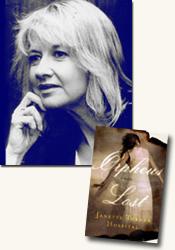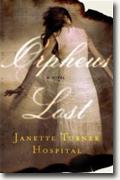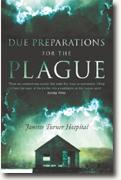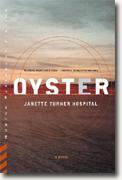author interview
book reviews:
· general fiction
· chick lit/romance
· sci-fi/fantasy
· graphic novels
· nonfiction
· audio books
· author interviews
· children's books @
curledupkids.com
· DVD reviews @
curledupdvd.com
newsletter
win books
buy online
links
home
for authors
& publishiss
for reviewers

|
|||||
 
Luan Gaines interviewed author Janette Turner Hospital
about her most recent novel,
Orpheus Lost Interviewer Luan Gaines: What was your inspiration for Orpheus Lost Janette Turner Hospital: All my novels have a very decisive moment of conception which involves the collision of an image and an idea. The idea trails a question that I feel a burning need to explore. This impact of image and question is as sudden and forceful as a flying baseball connecting with my head. I know the question isn't going to let me go until I've explored it for a few hundred pages. So for me a novel is a means of searching for answers.
Set in the not-too-distant future, Orpheus Lost I don't think of the novel as set in the future, but rather "in a time like the present." As indicated above, at the time the novel was germinating, and when I began writing, it did seem like a horrible possibility that there could be random suicide bombings in this country. I was still working on the novel when the London Underground bombings occurred in the summer of 2005, and that made the possibility seem even more likely, especially since those terrorists were home-grown. They were British citizens. We began to ask ourselves: could that happen here? Are there sleeper cells of American Muslims? So I wrote the novel as though that were our present.
In her work at MIT, Leela Moore applies mathematical principles to music, hence a profound connection to Mishka Barton. How does her love of numbers and his of complex music create a language only they can share? For those of us who are mathematically challenged but love music, is this connection something you understand? I myself am definitely among the mathematically challenged (in spite of the fact that I have taught at MIT.) And as for music: I am passionate about classical music, Early Music and Renaissance groups, and jazz, but my only musical skill is fervent listening. Nevertheless I have long known that there is a close correlation between mathematical and musical abilities (which is probably why I have neither). I had to do a lot of research in both areas. I'm lucky in having two resident musicians in the family. My husband is a fine pianist and organist; my daughter (now a mother of three) is a fine violinist, and I was a "Suzuki mom," which means I had to go to every one of my daughter's lessons and was more or less trained as her tutor for the violin (even though I can't play at all. I learned a lot about violins and violin playing by osmosis and observation).
This comment, made by Mishka's mother, is close in meaning to another, by a mathematician, that Leela keeps on a card thumb-tacked above her desk: Obsession is its own heaven and its own hell. The idea is that certain passions, a certain kind of intense neediness, certain kinds of obsessive desire override rationality. The bond between Leela and Mishka is like this.
Raised in the south, Leela and Cobb Slaughter also have a deep bond, one forged in childhood loss and a strong mutual attraction. Yet Leela moves on and Cobb cannot. Why? Both Cobb and Leela lost their mothers when they were very young, and both were reared by fathers thought to be a bit mad (in very different ways) by local society. This drew them together as children. Cobb's loss, however, was greater and far more traumatic. His mother committed suicide, and he was the one who found her hanged body. The prognosis for such trauma, at such a young age, is not good. That is why, for me, Cobb actually makes the longer and more difficult journey, and is, finally, the real moral hero of the novel. His act of atonement is loosely based on the actions of Joe Darby, the whistleblower of Abu Ghraib, similarly a patriot and idealist from a rural background, who paid dearly for doing what he felt morally bound to do. (It will be clear that I consider Joe Darby's courage quite extraordinary.) Is Cobb misdirected in his mission to purge the country of terrorists? How does his troubled past influence Cobb’s ability to perform his duties? I don't consider anyone misdirected for the desire to protect all of us from terrorist attacks. I'm quite willing to accept the ever-increasing hassle of airport security regulations, for example (and I fly a lot) in order to increase my chances of landing safely at the end of the flight. But there's a line to be drawn. We know it isn't always easy to draw that line. We know that sometimes one set of inalienable rights as spelled out in the constitution can be in conflict with another set of inalienable rights. Where do you draw the line between the right to free speech and incitement to hate, for example?
Mishka’s past is filled with beauty, music and loss, Mishka haunted by the unknown. How does Mishka’s parallel life in Boston threaten his security? I think anyone who is perceived to be, or feels himself/herself to be, an outsider in society is at risk in troubled times. There can be multiple reasons for outsider status, a history of family trauma being only one of them. Such outsiders don't have the kind of support network that keeps "normal" and "ordinary" people afloat, that vouches for them if they fall under suspicion for some reason. Because they are perceived as different, outsiders tend to keep to themselves, and are therefore perceived as secretive and suspicious. Shame kept Mishka from revealing his search for his father to Leela. If he'd only told her about this, she would have been able to react very differently to Cobb's evidence. She would have given extenuating explanations to Cobb. She would probably have been able to forestall what happened. Given his complete immersion in music, Mishka is a compelling character, his longing perfectly matched to Leela’s compassion and unconditional love. Is it possible for two such characters to exist without interference? I guess I'd have to call myself a Romantic Realist. I'd like to believe that love and shared passion can overcome all obstacles and all cultural differences. But relationships exist within a social and cultural matrix, and both history and literature are replete with examples of what happens when the relationship and the social context are out of kilter. Consider Romeo and Juliet; Othello and Desdemona, Anna Karenina and Vronsky. None of these transgressive passions ended well. The usual forecast is madness, suicide, murder. The great love stories are always as much about loss and yearning as about love. It is loss and yearning that sends Orpheus into the Underworld; it is anxiety and yearning that prompts the fateful backward glance that snatches Eurydice away forever (though their love triumphs historically in the multiple operas, poems, plays, and movies that have gone on recycling their story because we'd really like to believe that love triumphs.)
Leela and Cobb’s shared history in Promised Land, South Carolina is an unbreakable bond. Although Cobb has been changed by his experiences since last they met, Leela refuses to see him in any other way. How does Leela’s faith in him create a conundrum for Cobb? Cobb has always been in love with Leela and has always felt intense sexual passion for her. His love has always been mixed up with anger and jealousy: first simple jealousy of her easy self-confidence, then sexual jealousy of her popularity with other boys, and then jealousy of Mishka.
Why does Mishka cut himself off from his family after he leaves the Daintree? Does not this theme of anger and estrangement connect Mishka as well to Leela and Cobb? After Mishka starts school, he becomes aware of the fact that he has no father and this fact is both an aching void and a sense of shame. He was always an oddity and an outsider at school. When he finds out who his father was, his very identity is thrown into chaos. While he knows it is not logical to blame his mother for this, he has nowhere else to direct the anger. It has been my observation (both in terms of people I have known, and also from reading the psychological literature) that human beings instinctively seek to reduce pain by blaming the nearest available target and the least dangerous one. The greater the pain, the greater and more irrational the anger that is focused on the available target. For Mishka, the available target was his mother. She was also the least dangerous one. No degree of hostility on his part would ever turn her against him.
Leela’s father cannot accept her flight to the north- “the other side,” but Maggie is more patient. Why does Leela find it impossible to return home? Her father is a good and kind man. He also drives her crazy with his fundamentalist piety and his prayers for the wellbeing of her soul, which feel to her controlling and suffocating. When she goes home, she feels angry, and then she feels guilty for being angry with such a gentle person, so it's easier to stay off the merry-go-round altogether.
Mishka wants to learn to play the oud, a classical Persian instrument, as a way of identifying with the oud-playing father he has never known. So he places an ad for a teacher and thus he meets Youssef Hajj, a Syrian refugee in Australia. Youssef is not an extension of Uncle Otto; but when Mishka finds out that Youssef Hajj lost a brother to torture and execution, just as Uncle Otto had been lost to the Holocaust, they have something more than their interest in music to bind them. They are both also interested in a dialogue between western and eastern music. (Here, I had in mind the collaborations between Yehudi Menuhin and Ravi Shankar.) In composing their duet for violin and oud, Elegy for Uncle Otto and Mustafa Hajj, they are also paying tribute to the survival of the spirit over both western and eastern barbarities. Jamil Haddad declares there is no music in pure Islam and that “All of life is religious. Every statement is political.” Given the political environment in Boston, why isn’t Mishka more circumspect in his meetings with this radical young man? I find it tragic that fundamentalist Islam bans music altogether, when some of the world's most beautiful music comes from the Sufi tradition in Islam.
The Orpheus legend runs throughout Orpheus Lost In the myth, after Orpheus has lost Eurydice, finally and irrevocably for the second time, because of his own forbidden backward glance, he goes mad. He's lost her forever and it's his own fault. Mishka has an ominous premonition that he may be about to lose Leela forever because of his actions. Dream sequences bridge reality and the characters’ interior lives, a device that enriches the story. Are there pitfalls in blending fantasy and reality? In real life, of course, there are terrible penalties for anyone who loses track of the line between fantasy and reality. Since I'm writing a novel about people in such extreme circumstances that their nightmares are invading their waking lives, then it's a necessary literary device as a way of telling their stories. “Cobb thought of his addiction to the past as akin to his father’s benders.” Please explain this statement in the context of Cobb’s moral compass and his view of himself as a man. Addictive behavior is one way of dealing with pain. Cobb's father drinks to blot out his guilt about Vietnam and about his wife's suicide. Alcohol provides temporary comfort.
Given his troubled history, Leela is endlessly compassionate toward Calhoun Slaughter, Cobb’s father. Why? How does Calhoun compare to her Pentecostal Bible-quoting father? In small rural towns, whether they are in South Carolina or in Queensland, Australia (and I'm familiar with both), townspeople all feel as though they belong to an extended family. They make allowances for one another. They have a familial affection for the town idiot, the town eccentric, the town drunk, the Bible-quoting pastor and the foul-mouthed hellcat.
There are two terms pertaining to the shadowy world of detention camps and the treatment of terrorist suspects that have been much written about in the New York Times, and in multiple newspaper and magazine articles. The terms are "rendition" and "ghosting." Over the past two or three years, I've amassed a thick file on these.
What was the most challenging in writing Orpheus Lost Writing the prison scene and the torture scene. I didn't think I could do it. I'm a member of Amnesty International because I do believe that a nation that tolerates torture, no matter what the degree of national risk, no longer has the right to call itself civilized. (That was part of our rationale for overthrowing Saddam Hussein: we were outlawing a barbaric regime and bringing the ideals of democracy to Iraq.) I have trouble even reading the depositions of victims that are in Amnesty International newsletters because they are so disturbing. So the only way I could write that scene was at an oblique angle, as it were, imagining Mishka separating himself from his body and hallucinating. The most rewarding? The most pleasurable part was recreating the Daintree rainforest around me. I felt like the children in The Lion, The Witch, and the Wardrobe, being able to sneak away into my secret world. The year I was twenty (which is a very long time ago) I taught in the school that I have Mishka go to and I fell in love with the Daintree. Australian rainforest is one of my addictions. I return to it every year. It is another world, pristine and perfect. What message would you like the reader to take from Orpheus Lost In a novel, I am exploring questions for myself, and the questions concern the intimate and personal human consequences of historical and political upheavals. I hope my exploration leads readers to ponder these questions for themselves and to arrive at their own answers. I simply want to make my reader think. Do you have any advice for would-be authors? Read voraciously. Become your own toughest critic. Only keep writing if the act of writing itself – the fondling of words and of rhythms and the creation of a self-contained world – is such a pleasurable addiction that you can't give it up. Janette Turner Hospital received Australia's Patrick White Award for lifetime literary achievement. She holds an endowed chair as Carolina Distinguished Professor of English at the University of South Carolina. Luan Gaines is a freelance writer and contributing reviewer to curledup.com. Her interview with Janette Turner Hospital was written in conjunction with her review of Orpheus Lost. © Luan Gaines/2007.
|
|||||
| fiction · sf/f · comic books · nonfiction · audio newsletter · free book contest · buy books online review index · links · · authors & publishiss reviewers |
|
| site by ELBO Computing Resources, Inc. | |



